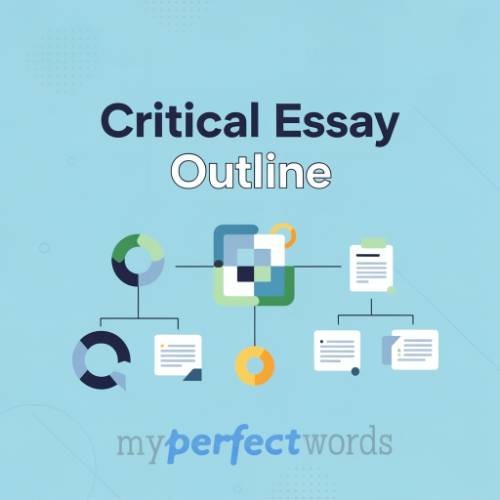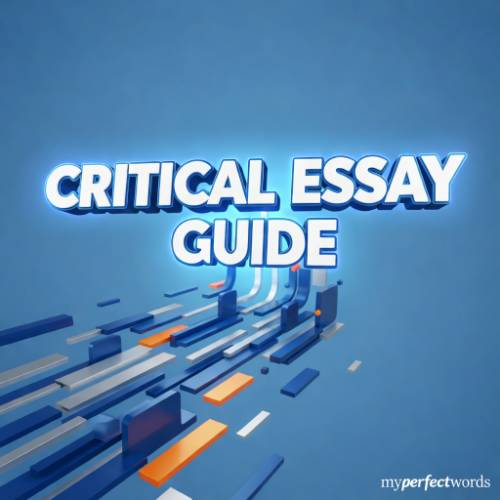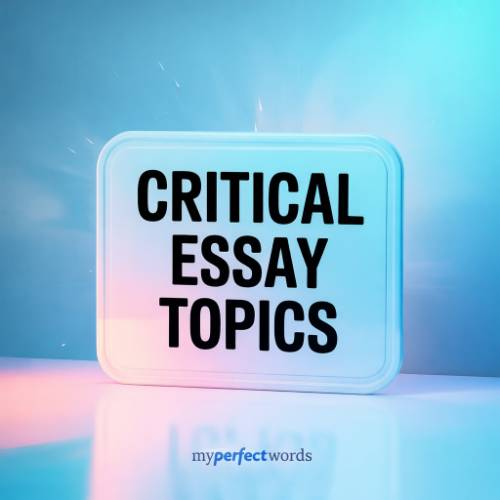Basic Outline Structure for Critical Essays
If you are learning to write a critical essay, you must understand that the outline is an essential part of writing. For some writers, an outline of a critical essay is not usually needed, but it can be helpful for a proper structure.
Here’s a sample outline for a critical essay:
Critical Essay Outline Template
I. Introduction
- Opening Hook
- Contextualize the Topic
- Thesis Statement
- Preview of Key Points
- Transition to Body
II. Body Paragraph 1
- Topic Sentence
- Introduction of Evidence
- Critical Analysis
- Transition to Next Point
III. Body Paragraph 2
- Topic Sentence
- Introduction of Evidence
- Critical Analysis
- Transition to Next Point
IV. Body Paragraph 3
- Topic Sentence
- Introduction of Evidence
- Critical Analysis
- Transition to Conclusion
V. Conclusion
- Restate the Thesis
- Review Key Points
- Broader Implications
- Closing Statement
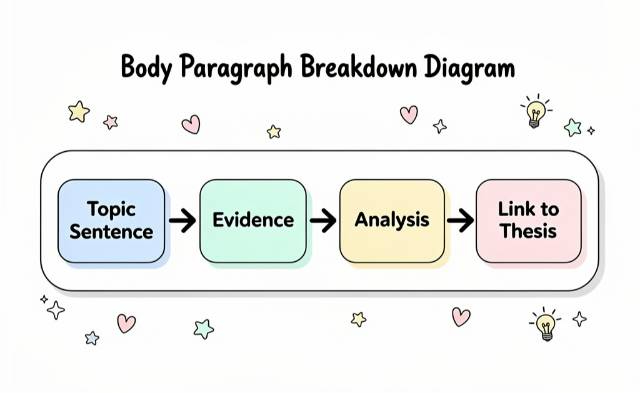
Critical Essay Fill in the Blank Template
Just copy the template below, and just fill in the blanks, and start writing instantly.
Title:
“_____________________________”
Introduction
Start by introducing the text and your critical focus.
Text/Author: “_____________________________”
Type of Work (novel, article, film, etc.): “_____________________________”
Brief Context: “_____________________________”
Thesis Statement: _“This essay argues that _______________________________ because ______________________________.”
Body Paragraph 1
Focus on one key argument.
Topic Sentence: _“One significant aspect of __________________ is ______________________________.”
Evidence/Quote: _“For example, ______________________________.”
Analysis: _“This demonstrates that _______________________________ and supports the thesis because ______________________________.”
Body Paragraph 2
Introduce a second critical point.
Topic Sentence: _“Another important element is ______________________________.”
Evidence/Quote: _“For instance, ______________________________.”
Analysis: _“This highlights _______________________________ and strengthens the argument by ______________________________.”
Body Paragraph 3 (Optional: Counterargument or Limitation)
Counterargument/Alternative View: _“Some may argue that ______________________________.”
Rebuttal/Analysis: _“However, _______________________________ because ______________________________.”
Conclusion
Wrap up your essay with a final evaluation.
Restate Thesis: _“In conclusion, ______________________________.”
Summarize Key Points: _“The main arguments discussed include _______________________________ and ______________________________.”
Significance/Final Thought: _“Ultimately, this analysis shows _______________________________ and emphasizes ______________________________.”
Critical Essay Filled Outlines
When writing a critical essay layout, even the slightest error can jeopardize both your grades and reputation.
Examining the following templates will allow you to determine the appropriate tone and structure for your critical paper. For that, the outlines given below serve as a valuable starting point, providing clarity and guidance as you begin your writing process without uncertainty.
Here are some filled outlines for critical analysis essays:
For more such samples, check out our critical essay examples.
Tips for Writing an Effective Critical Essay Outline
Crafting a robust critical essay structure is essential for a successful writing process. Here are valuable tips to guide you through the outline creation:
- Start with a Strong Thesis Statement
Begin your outline by clearly articulating your thesis statement. This should succinctly convey the main argument or perspective you will be exploring in your critical essay.
- Identify Strengths and Weaknesses
As you outline, consider the strengths and weaknesses of your argument. Acknowledge potential counterarguments and ensure your outline addresses them, strengthening your overall analysis.
- Support Your Thesis
Each section of your outline should contribute to supporting your thesis. Ensure that your key points and evidence align cohesively to strengthen the central argument of your critical essay.
- Consider Writing Style
Pay attention to your writing style within the outline. Maintain a formal and analytical tone appropriate for a critical essay. Use clear and concise language to convey your ideas effectively.
- Analyze and Evaluate Key Points
For each section of your outline, go beyond surface-level analysis. Dive deep into the material, analyzing and evaluating key points to provide a nuanced and comprehensive critical assessment.
- Pay Attention to Detail
Detail matters. Pay attention to the specifics of your outline, ensuring a logical flow of ideas and a well-organized structure. Clarity at this stage sets the foundation for a polished final essay.
- Start Writing Early
Once your outline is complete, don't procrastinate. Start writing early to allow ample time for revisions and refinements. A well-thought-out outline expedites the writing process.
Pick your topic wisely as any random topic cannot be turned into A grade essay. Select an essay topic that aligns with your interests and allows for in depth analysis. For this purpose, check out our critical essay topics list.
ANALYSIS OUTLINE HELP
Get a Perfectly Written Critical Essay Outline
Save time, reduce stress, and submit with confidence.
Critical Essay Structure for Different Academic Levels
Here’s a clear breakdown of critical essay structure for different academic levels, showing how complexity and depth grow as students advance:
1. Critical Essay Outline for High School Level
Purpose: Introduce basic critical thinking and textual evaluation.
| Section | Structure & Tips |
|---|---|
| Introduction | Briefly introduce the text, author, and context. Include a simple thesis stating your main opinion or evaluation. |
| Body Paragraphs | 2–3 paragraphs. Each focuses on one point. Use quotes/examples and explain how they support your opinion. |
| Conclusion | Summarize main points, restate thesis in your own words. Optional: add a short reflection on the text’s impact. |
| Notes | Keep language simple and clear. Focus on expressing your ideas logically rather than using advanced terminology. |
2. Critical Essay Outline for Undergraduate/College Level
Purpose: Develop deeper analysis, supporting evidence, and critical evaluation.
| Section | Structure & Tips |
|---|---|
| Introduction | Context, text info, and a clear, arguable thesis. Include a brief overview of the points you’ll cover. |
| Body Paragraphs | 3–5 paragraphs. Each paragraph has: topic sentence, evidence, detailed analysis, and link to thesis. Address at least one counterargument if relevant. |
| Conclusion | Summarize key findings, restate thesis with nuance, and discuss broader significance of your analysis. |
| Notes | Use academic tone. Incorporate critical vocabulary (e.g., “demonstrates,” “underscores,” “reveals”) and proper citations. |
3. Critical Essay Outline for Graduate/Master’s Level
Purpose: Provide sophisticated, nuanced critique with engagement in scholarly debates.
| Section | Structure & Tips |
|---|---|
| Introduction | Brief contextualization, research gap or relevance, strong thesis showing critical stance. May reference scholarly debate. |
| Body Paragraphs | 5–8 paragraphs. Each paragraph integrates evidence, critical theory, and multiple perspectives. Explicitly discuss limitations or alternative interpretations. |
| Counterarguments | Often a dedicated section analyzing opposing views in depth, showing awareness of complexity. |
| Conclusion | Restate thesis, summarize insights, highlight contribution to understanding of the text, suggest future areas of research or application. |
| Notes | Use precise, formal academic language. Engage with sources critically. Strong integration of theory and evidence is expected. |
4. Critical Essay Outline for Doctoral/PhD Level
Purpose: Original contribution to knowledge; high-level critical analysis and synthesis of research.
| Section | Structure & Tips |
|---|---|
| Introduction | Establish research context, articulate a complex thesis, outline methodology of critical analysis. Highlight originality. |
| Body Sections | The essay may be divided thematically or methodologically. Incorporate extensive scholarly research, critical frameworks, and nuanced analysis. Each section must contribute to your overarching argument. |
| Critical Discussion | Engage in deep theoretical debates, evaluate conflicting interpretations, and demonstrate mastery of the field. |
| Conclusion | Summarize contributions, implications, and limitations. Suggest directions for future research. |
| Notes | Precision, clarity, and rigor are essential. Argumentation should reflect a high level of scholarship and independent thought. |
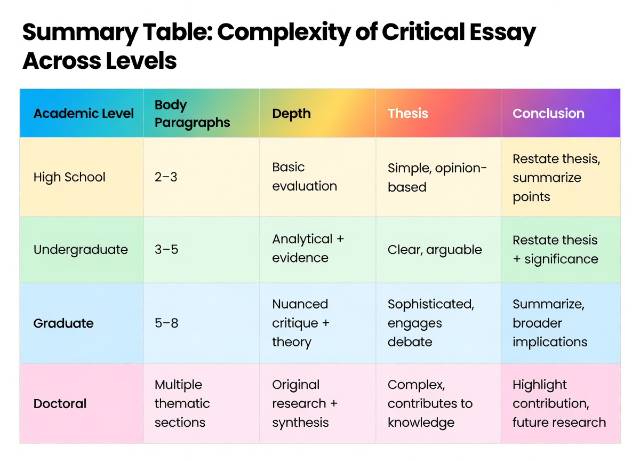
Bottom Line
Crafting a critical essay requires careful planning and consideration. By following a well constructed outline, you lay the groundwork for a compelling essay that showcases your analytical prowess.
Remember to start with a strong thesis statement, identify strengths and weaknesses, and support your argument with well researched evidence.
If you think your writing and analysis skills are not up to the mark, you can review the critical essay guide to ensure all writing steps are covered while completing your essay.
Need Help Crafting a Strong Critical Essay?
Work with academic experts who understand critical evaluation.
- In-depth textual analysis
- Balanced and well-supported arguments
- Proper academic tone and structure
- Reliable and punctual submission
Submit your critical essay with clarity and confidence.
Get Started Now